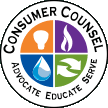Hang Up On High Pay Phone Rates
Information from the FCC
Background
Consumers who make calls away from home should be aware that the long distance and local rates charged from payphones and phones in other public areas like hotels, motels, hospitals and airports can vary. Operator Service Providers (OSPs) provide long distance service (and in some cases, local telephone service) from public and pay telephones. When you place a call from a public or pay phone, the OSP serving the telephone usually handles the call if you dial "0" before dialing the telephone number.
Three Simple Rules
- Stop before making the call.
- Look at the printed information on or near the telephone. Federal Communications Commission (FCC) rules require each public telephone provider to post on or near each telephone - in plain view of consumers - the name, address, and toll-free number of the OSP.
- Listen after you dial the number you are calling to determine which OSP is handling your call. The OSP must orally identify itself to you at the beginning of the call before the call is connected and billed. You will then be told how to learn the total price of a telephone call - including any surcharges - by simply pressing no more than 2 digits, such as the pound key, or by staying on the line. This gives you the opportunity to hang up on high rates and to "dial around" the OSP by following your chosen long distance company's instructions for placing calls from public telephones (e.g., dial 1-800-XXX-XXXX to reach your chosen long distance carrier; punch in your access code, etc.)
Be Phone Wise: Know the Rules
- You have the right to place calls from a public telephone through the long distance company of your choice by dialing an access code ("dialing around" the OSP). "Dialing around" may mean dialing an 800 number, a local number that begins with 950, or a seven digit access number known as a 101-XXXX or 10-10-XXX number. Federal law prohibits blocking 800, 950, 101-XXXX, or 10-10-XXX access numbers to long distance companies from public telephones.
- OSPs must connect an emergency call to the appropriate emergency service immediately and at no charge.
- OSPs cannot knowingly bill for unanswered calls.
- Unless you use coins to pay for a call, the OSP will require you to charge the call to a calling card, call collect, or bill the call to a third party.
- No matter what type of calling card you use, the only way to be sure that your call will be carried by your chosen long distance company is to follow your long distance company's dialing instructions for placing calls from public telephones. Using your preferred long distance company's calling card will not, by itself, guarantee that that company will carry the call.
What About Calls from Correctional Facilities?
Consumers receiving collect calls from inmates in prisons, jails and other correctional institutions can obtain the price of the call by simply pressing no more than 2 digits or by staying on the line. OSPs providing operator services for inmates' phones in correctional facilities are required to tell the party receiving a collect call of his or her right to obtain rate quotations before the OSP connects and bills for the interstate collect call. (Note: FCC rules only apply to interstate OSP calls. However, most states have similar requirements for local intrastate OSP calls.) The party receiving the call can then decide whether or not to accept the collect call or limit its length.
Filing a Complaint with the FCC
You can file a complaint by:
e-mail fccinfo@fcc.gov
the Internet www.fcc.gov/cgb/complaintfiling.html
telephone 1-888-225-5322
TTY 1-888-835-5322
mail Federal Communications Commission
Consumer & Governmental Affairs Bureau
Consumer Inquiries and Complaints Division
445 12th Street, SW
Washington, DC 20554
Your complaint letter should include:
- Your name, address and telephone number where you can be reached during the business day;
- the telephone number involved with the complaint;
- as much specific information about the complaint as possible;
- a description of the steps you took to resolve the complaint;
- the names and telephone numbers of the company employees that you talked with in an effort to resolve the complaint, and the dates that you talked with these employees;
- copies of bills listing the disputed charges (circle the disputed charges on the copy of the bill); and
- the relief that you are requesting (such as adjustment of charges).
*****To receive information on this and other FCC consumer topics through the Commission's electronic subscriber service, go to www.fcc.gov/cgb/emailservice.html

